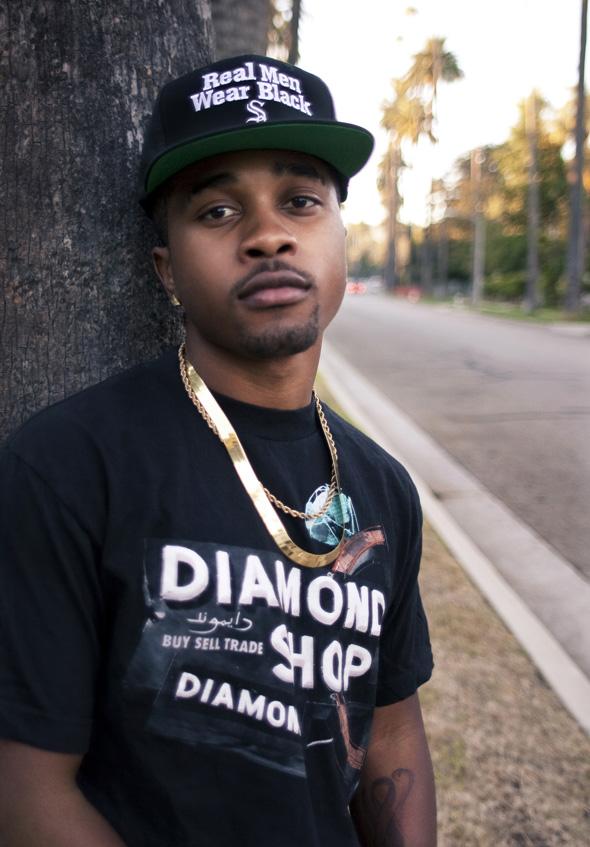
These are the stark contrasts associated with Los Angeles, but what is life like for those caught in the middle? Those close enough to witness the affluent lifestyles of the rich and famous, but also living in near proximity to the rundown, lawbreaking ‘hoods’? Enter 19-year-old rapper Mann.
Raised in a single-parent home in West LA, right next to Hollywood, for him, deciding whether or not to join a gang wasn’t as clear cut as it is if you have the ‘ride or die’ mentality many kids living in LA have no choice but to adopt. So which side did he take?
Flavour talks culture with Mann for a fascinating insight into the music and gangs of LA. ‘We are right by Baldwin Hills, but it’s not at all a wealthy area,’ he explains. ‘I rep the Westside hard, because I feel like we’re the side nobody really knows about. Everybody knows about Compton and Long Beach, both on the Eastside, and West LA is like the hood behind Hollywood.’
Mann has been blowing up the charts, both here and in the US, with his latest track ‘Buzzin’ featuring 50 Cent. ‘50 feels like right now he can be an artist,’ he says. ‘He doesn’t need to worry about any cheques or anything like that. He just does what he wants to do. He’s at that point now. The fact that he jumped on my record because he genuinely liked it… that means a lot to me.’
Hood Life
Despite growing up in a notorious gang-ridden area, Mann was lucky enough to avoid going down the same extreme road as his ‘Buzzin’ collaborator 50 or getting shot along the way. So how did he find himself on the right path? ‘Growing up in the hood, there is a certain standard of how tough you have to be to come from LA, because LA has such a gang-related and violent image. Growing up… that was really hard because it was just me and my mum. So I wasn’t really the tough kid at first, but then I was peer-pressured into fighting a lot of the time and it kind of made me a lot tougher. I was fighting all the time.
‘There was a time where I was getting really bad,’ he continues, ‘and my mum saw that and wanted to keep me away from it. That’s why she put me into acting school, and that’s why I am the way that I am – because I didn’t really get swallowed up by it. That’s just part of life in LA – you have to be really strong in order to make it.’
Although much less publicised than it used to be, gang culture in LA is still prevalent. And yet the younger generations are slowly moving away from that now, realising there is more to life than what can be offered as a gang member. ‘It hasn’t gone away at all,’ affirms Mann, ‘but the younger people are on to different things. We’ve seen the effects of gang culture and gang life so many times, and we know the outcomes. Most young people now choose not to get involved.’
There are actually more than 250 active gangs in the city, according to the LAPD, many of which have been in existence for over 50 years. Despite the heavily publicised rivalry between the Crips and Bloods – mainly African American – there are approximately 30 Asian gangs operating in the South Central area and a strong presence of the Mexican Mafia and MS-13. These gangs have a combined membership of more than 26,000 people, some as young as 11. Rape, aggravated assault and robbery are all crimes heavily related to gangs across LA.
The gangs that reside in LA often tag their local area in graffiti to mark their territory. Anyone seen in a heavily tagged area is a potential target to any rival gang, irrespective of involvement. Children and innocent bystanders are frequently killed in this way. Even with that said, the ripple effect of gang culture is equally alarming. A psychological study by the Lancet and Rand Corporation showed that a small percentage of children living in South LA showed a higher level of post-traumatic stress than children of a similar age living in the capital of war-torn Iraq.
Gang culture has become a way of life for those affected, with third generation gang members to one family. This may be the reason why rap music from LA has always had a very raw sound, both in content and sound. Often labelled as ‘gangster rap’, it comes with an excessive use of profanity, talk of violence and prolific use of ‘bitch’ and ‘hoe’ to describe women; some rappers have even openly declared gang affiliations, throwing up gang signs in their music videos and wearing gang colours to prestigious events. Although it’s not easy subject matter to digest, many devout hip-hop fans would argue that at least the content of such music is ‘real’.
Musical crticism
Due to his background, being signed by a major record label so quickly and the route his career has taken thus far, these things may not be said so freely about Mann. Is he prepared for the critique that comes with being a rapper classed as commercial pop?
‘Definitely, and I believe I will get that,’ he says, ‘but I will be dropping other records underneath the album – mixtapes and online. I feel that you kind of have to do that now. It’s not just one way no more. You can drop stuff for the charts, then drop stuff online. Whoever wants to hear will hear what they like and listen to what they like. I want to make music, so whatever the people like, that’s what I want to do. I’m not a gangster, I’m not a gangbanger. I just love music.
‘When it comes to music coming out of LA, there isn’t that much more you can do with it. Everybody is so tired of that now; you just get the same thing. You get more or less the same song each and every time. So now we’ve [LA] really become creative; when it comes to new artists we have had to go back to the drawing board. LA is coming out with a lot of new artists, talking about different things.’
Seeing an increase in gang culture at a very alarming rate in the UK, at a time when the kids in LA are starting to fall away from that lifestyle, what advice can Mann offer as someone from a place that seems to have (hopefully) been there and done that.
‘Honestly,’ says Mann, ‘there is no real solution. You have to really look at what is going on. With gangs, there is nothing positive that comes with it. If you can name anything positive, I would really want you to try. There is nothing you can say. I think people need to look at the bigger picture and not look at the short term. In the long run, that lifestyle is not going to help you – at all.’
All in all, he’s is a regular 19-year-old guy, firmly grounded, with a humble personality. So much so, that the West LA rapper frequently states in his interviews that he will respond to all his Twitter messages individually.
‘It doesn’t hurt to take just 10 minutes out of my day and look at all my @ replies and try to respond to as many as possible. If I don’t get them all, just keep hitting me and you will get a response.’
There’s an offer you can’t refuse. Making such a generous statement must have led to a lot of very strange Twitter conversations?
‘Somebody just really went hard on me one day, like, “You are the worst… I’ve never heard anybody that’s as bad as you, you cannot rap.” I just responded with, ‘Wow…’ Then he was like, “Oh my God! Mann Tweeted me back! This is crazy! I’m a big fan of yours.” [Laughs]. It’s so funny. You can’t really get mad. Twitter is just Twitter.’ Man, oh Mann, what a world!
Follow Mann on Twitter (and you will get a response) @MANN or visit www.mannsworld.net


